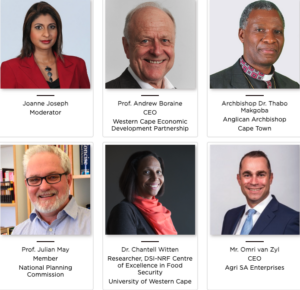Time: 09:00 - 10:30
Venue: Zoom
Despite South Africa producing enough food to feed its population, the country faces a food crisis that also affects the most vulnerable: our children. NIDS-CRAM data reported that just over one-quarter of households (27%) contained a child who had experienced hunger almost every day or every day the week before they were interviewed in April/May 2021.
Millions of children suffer malnutrition which is caused by shortages of vitamins and minerals in their diet; this has been the trend over the past 20 years. A 2022 United Nations Food Systems Profile found that the country is facing a ‘triple burden of malnutrition’, including undernutrition, micronutrient deficiencies and obesity.
Malnutrition leads to stunting and just about one-quarter of children under five (27%) were reported stunted as of 2016. The Child Support Grant that supports more than 12 million children (61% of all children), although crucial, has not adequately addressed child hunger.
What should business, the government and faith communities do to urgently address child hunger?
Join Joanne Joseph and her panel of experts, including CoE-FS director Professor Julian May and CoE-FS researcher Dr Chantell Witten, as they discuss the role of ethical leadership in addressing child hunger – business, government, and faith communities.

To register, please visit the event page here.
Originally published by Arena Events.
Upcoming Events
Our GOALS
We recognise that producers, processors, distributors and consumers are incorporated into the food system under varying terms and returns. We also recognise the economic, social, human and environmental health impacts associated with food security. Therefore our goal is to conduct research, build capacity and disseminate findings that will promote a sustainable food system in South Africa.
Our MISSION
Our research is concerned with the scale, nature, causes and consequences of food insecurity in South Africa and elsewhere on the African continent. Thus our mission is to investigate products, technologies, processes and policies that can reduce food insecurity and mitigate its negative outcomes. We seek to make a difference to food security by linking innovative science with critical enquiry.



